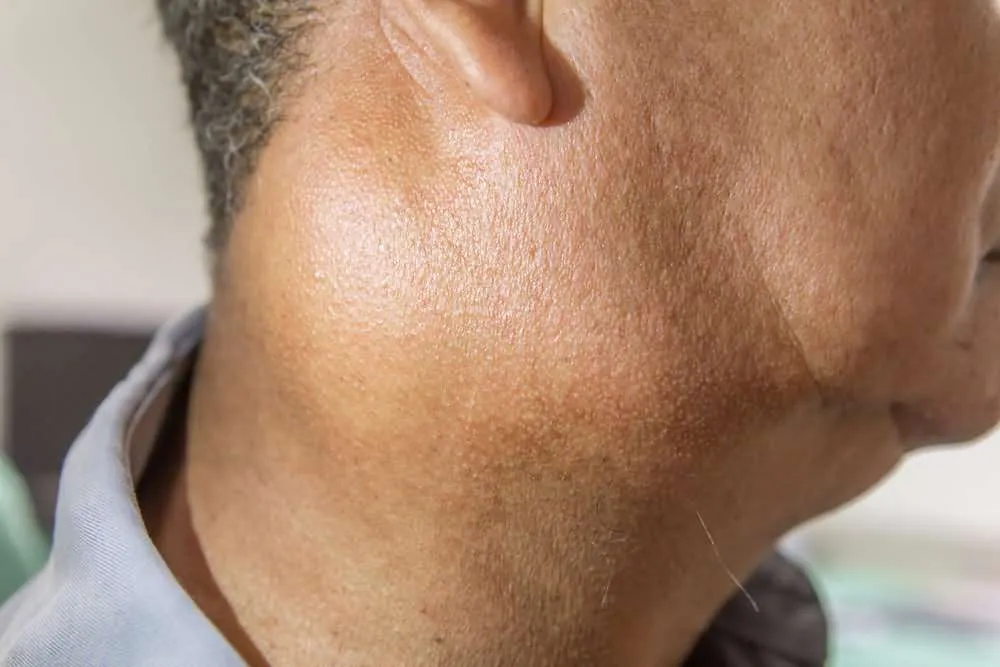

Swollen Inguinal lymph nodes generally mean your body is working to fight an infection or illness. Like all lymph nodes, inguinal lymph nodes are a part of your lymphatic system and work with your immune system to fight disease and infection. Washington University School of Medicine in St. Inguinal lymph nodes are lymph nodes in your groin. Medscape: “Scrofula Overview of Scrofula.” UpToDate: “Patient education: Conjunctivitis (pink eye).” Johns Hopkins Medicine: “Tinea Infections (Ringworm).”
#Enlarged lymph nodes skin
New York State Department of Health: “Gonorrhea,” “Bacterial Skin Infections: Impetigo and MRSA.”Īmerican Academy of Family Physicians: “Syphilis.” Journal of Clinical Medicine Research: “Generalized Lymphadenopathy as Presenting Feature of Systemic Lupus Erythematosus: Case Report and Review of the Literature.” Medscape: “Early Symptomatic HIV Infection.”Īmerican Cancer Society: “Lymph Nodes and Cancer.” Harvard Health: “The respiratory tract and its infections.”ĬDC: “About HIV/AIDS,” “Cat-Scratch Disease.” (Talk to your doctor before giving aspirin to children or teenagers.Mayo Clinic: “Tooth abscess,” “Swollen lymph nodes,” “Gonorrhea,” “Phenytoin (Oral Route).” Over-the-counter pain relievers: Acetaminophen, aspirin, ibuprofen, or naproxen may make you feel better. Getting good rest can help you get over a mild illness faster. A washcloth rinsed in hot water and placed on the area that hurts may help ease pain. A few things may help with any discomfort while you wait for it to run its course: If your swollen lymph nodes aren’t caused by something serious, they will go away on their own. Swollen Lymph Node Treatment and Home Remedies
#Enlarged lymph nodes series
This is done less commonly.ĬT scan. A series of X-rays are taken from different angles and put together to form a more complete picture. It may help identify a variety of conditions like some cancers, heart disease and brain disorders. PET scan. This looks at the chemical activity in parts of your body. A powerful magnet and radio waves are used to make detailed images of your organs and tissues.īiopsy. Lymph node tissue is removed and looked at under a microscope. High-frequency sound waves are used to let your doctor see what’s happening inside your body. They also may recommend one of these tests to find out more about what's going on: They might be able to get an idea of what's making your glands swell by where they are in your body. Your doctor will start by asking you about your medical history and giving you a physical exam. If you notice any of these, see your doctor. The area around the glands turns red or purple, it feels warm or you see pus Glands that stay swollen for more than 5 days in children or 2 to 4 weeks in adults Glands that feel hard or don't move when you push on them Glands that are much larger than they should be, not just mildly swollen In most cases, swollen glands return to normal size after the illness or infection has passed. When to See a Doctor for Swollen Lymph Nodes Lymphoma, a cancer of the lymphatic system.HIV/AIDS, an infection spread through sexual contact and IV drug use.A problem with your immune system, like lupus or rheumatoid arthritis.Lyme disease, an infection spread through a tick bite.Tuberculosis, an infection that usually affects your lungs.Much less often, it can be a more serious illness. A bacterial infection, like an ear infection, skin infection, or infected tooth.Usually, it's something that's relatively easy to treat, like: Your lymph nodes come across all kinds of germs, so they can be swollen for lots of reasons. When you're fighting off harmful germs, your body makes more of those immune cells - that causes the swelling. They attack bacteria, viruses, and other things that can make you sick. Lymph nodes have immune cells called lymphocytes in them. Hard lymph nodes that won’t move or get bigger quickly (signs of certain types of cancer) Swelling of clusters of lymph nodes in different places in your body (caused by an infection or an immune system disorder, like rheumatoid arthritis) Runny nose, sore throat, or fever (caused by an upper respiratory infection) Swelling that makes your lymph nodes the size of a kidney bean or possibly largerīecause swollen lymph nodes are usually linked to some type of illness, you might also have other symptoms, depending on what that illness is: Along with your spleen, tonsils, and adenoids, they help protect you from harmful germs. You can sometimes feel these clusters as little bumps, especially if they're swollen. There are clusters of them in places like your neck, under your arm, and in the crease between your thigh and your torso (where your leg begins). Lymph nodes are round, bean-shaped glands, and you have them throughout your body. Most of the time, they return to normal size when their job is done. Swollen lymph nodes are a sign that your body is fighting off an infection or an illness.


 0 kommentar(er)
0 kommentar(er)
